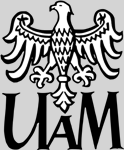Dorota Lipowska - Research
From Department of Applied Logic
CV | Research | Publications | Texts on line
My previous area of interest was computational linguistics, in particular, methods of syntactic and semantic natural language analysis. Mainly, I was interested in formal grammars that can be employed in this field, especially as a basis for natural language parsers. In my PhD thesis, I have described the MLA grammar - a variant of a categorial grammar in which some features of the Montague grammar and Hausser’s left-associative grammar are combined. The parser I have implemented based on the MLA grammar analyses a sentence word by word from left to right (i.e., in the left-associative manner) building at the same time its tree analysis as well as its corresponding formula of intensional logic.
In addition, I cooperate with prof. Adam Lipowski (Institute of Physics, AMU) on computer modelling of some interdisciplinary problems. For example, using simulated annealing we study some variants of the travelling salesman problem. Moreover, we examine population dynamics and the evolution of multi-species ecosystems (e.g., oscillations, extinctions) using lattice prey-predator models. Also using multi-agent modelling, we studied a bio-linguistic transition and the Baldwin effect in an evolutionary naming-game model.
Currently, my main area of interest is evolutionary linguistics. An approach similar to modelling of some physical phenomena can be used to study certain issues related to the origin and evolution of language. We are particularly interested in the process of achieving linguistic coherence. Therefore, we deal with computer simulations of multi-agent systems, mainly using so called language-game models to study the emergence of linguistic conventions and their coordination in the population depending on the dynamics of the population, the network of connections and the nature of interactions between agents, including their learning or migration.



